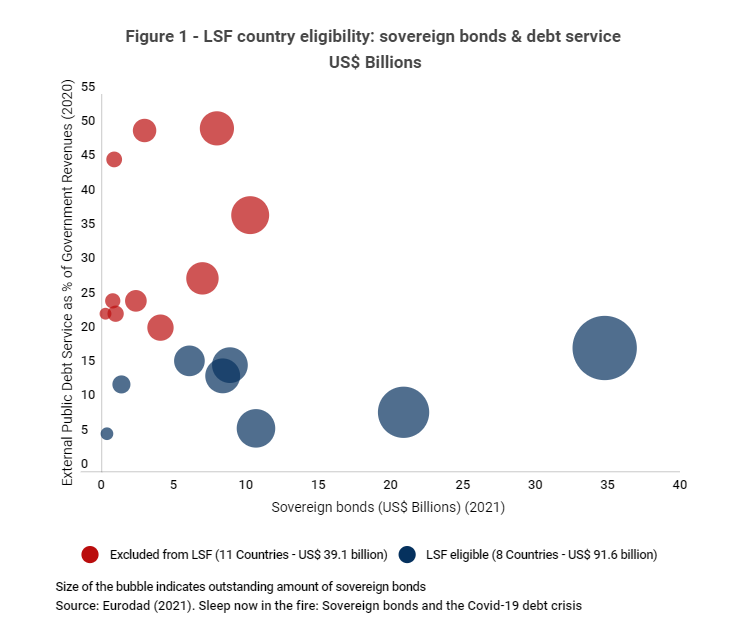Development Finance Watch - Who benefits from the Liquidity and Sustainability Facility?/ Eurodad Annual Report

#Covid19 #LSF #EIB #G7 #AnnualReport #IMF #GPF #Climate #SDRs
Top story

Liquid illusions: Who really benefits from the Liquidity and Sustainability Facility?
During the past year, the United Nations Economic Commission for Africa, in partnership with the US asset management firm PIMCO, has advocated for the establishment of a Liquidity and Sustainability Facility (LSF). The LSF has been presented as a mechanism to support countries in Africa in the aftermath of the Covid-19 pandemic. But which countries and investors really stand to benefit?
Click here to read the full blog.
News & blogs
Joint Civil Society Letter to the EIB Board of Governors
Last week, the European Investment Bank's board of governors convened. Together with 24 other Civil Society Organisations, we asked the bank to reform. By following the six steps outlined in our open letter, Finance Ministers could transform EIB into a public bank that works for everyone.
Read the full letter here.
The relentless quest to mobilise private investment in infrastructure: more de-risking is not the answer
While G7 leaders argue that they "aim for a step change" in their approach to infrastructure financing, a market-led approach is still at the heart of the G7’s plan to "build back better" for the world. In the following blog, María José Romero, Farwa Sial and Flora Sonkin analyse the proposals, the risks and an alternative way of thinking about infrastructure.
Click here to read the full blog.
Reports & useful resources
Eurodad's Annual Report 2020 is now available
Our 2020 Annual Report is now available to download - giving a comprehensive overview of our impacts and achievements last year.
Click here to download the report.
The new debt crisis and what to do about it
By Bodo Elmers for the Global Policy Forum
Global debt levels have been surging constantly over the past decade, and the need to fight the Covid-19 crisis with running fiscal deficits and borrowing money has been a further shock to global economies. The risk of debt crisis is high and debt service costs are rising rapidly.
Click here to read the full report.
How to Get the Biggest Bang for your IMF Buck
By Nadia Daar, Head of the Washington DC Office for Oxfam International, for Global Policy
In this blog, Nadia Daar provides a framework to assess and improve Special Drawing Rights reallocation schemes.
Click here to read the full opinion piece.
How Domestic Budget Shortfalls Due to COVID-19 Impact Climate Action
By Molly Caldwell, Natalia Alayza and Gaia Larsen for the World Resources Institute
Climate action should be an essential part of any national budget, and countries take different approaches to funding this work. But in developing countries around the world, COVID-19 has dramatically impacted what governments are spending money on and how much money they have to spend, devastating this first source of climate spending.
Click here to read the full blog.
Defending public services is defending democracy
Marking United Nations Public Service Day on 23 June, a whole range of media worldwide are relaying an open editorial signed by Magdalena Sepúlveda Carmona and Rosa Pavanelli, GI-ESCR and Public Services International Directors on the impact of the pandemic and the urgent need to defend and strengthen public services, hence democracy as a whole.
Read more about this here.
Upcoming events
8 July | Webinar on the influence of developing countries in the Inclusive Framework
This webinar will explore the extent to which developing country members of the IF can meaningfully participate, set the agenda and influence outcomes in OECD discussions on international corporate taxation.
14 July | Eurodad's Debt Wednesdays -Public debt data resources | Mobilisation and advocacy strategies
The last session of the Debt Wednesday's training course will focus on how to get involved in the debt movement. We are going to explore Jubilee Debt Campaign's debt data portal, before moving to a session on mobilisation and advocacy strategies.
 |
This newsletter has been produced with co-funding from the European Union, Bread for the World and Norad. The contents of this publication are the sole responsibility of Eurodad and can under no circumstances be regarded as reflecting the position of the funders. |




